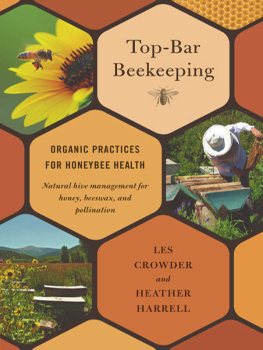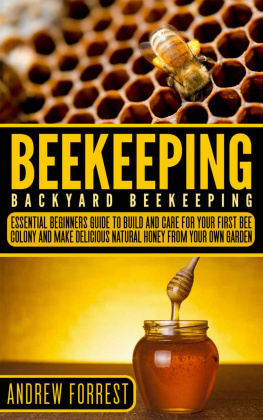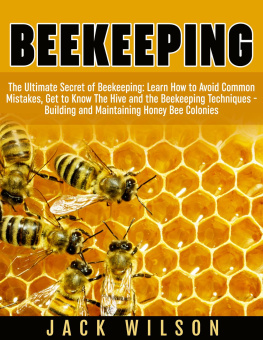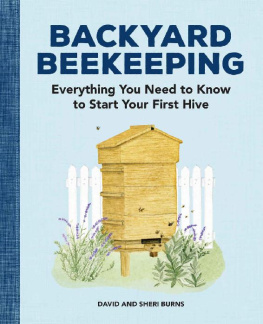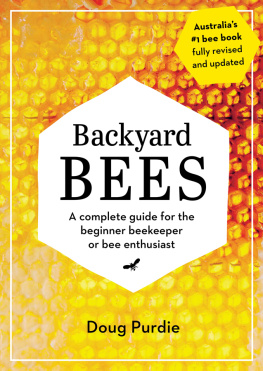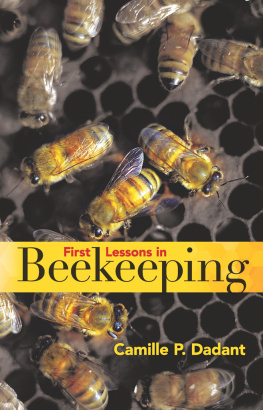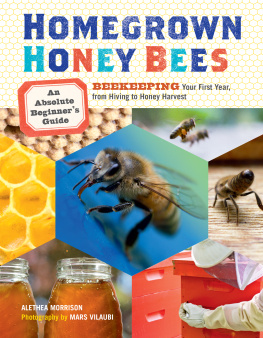Bonney - Beekeeping
Here you can read online Bonney - Beekeeping full text of the book (entire story) in english for free. Download pdf and epub, get meaning, cover and reviews about this ebook. year: 2012;1993, publisher: Storey Publishing, LLC, genre: Children. Description of the work, (preface) as well as reviews are available. Best literature library LitArk.com created for fans of good reading and offers a wide selection of genres:
Romance novel
Science fiction
Adventure
Detective
Science
History
Home and family
Prose
Art
Politics
Computer
Non-fiction
Religion
Business
Children
Humor
Choose a favorite category and find really read worthwhile books. Enjoy immersion in the world of imagination, feel the emotions of the characters or learn something new for yourself, make an fascinating discovery.

Beekeeping: summary, description and annotation
We offer to read an annotation, description, summary or preface (depends on what the author of the book "Beekeeping" wrote himself). If you haven't found the necessary information about the book — write in the comments, we will try to find it.
Beekeeping — read online for free the complete book (whole text) full work
Below is the text of the book, divided by pages. System saving the place of the last page read, allows you to conveniently read the book "Beekeeping" online for free, without having to search again every time where you left off. Put a bookmark, and you can go to the page where you finished reading at any time.
Font size:
Interval:
Bookmark:
A PRACTICAL GUIDE
Richard E. Bonne

The mission of Storey Publishing is to serve our customers by
publishing practical information that encourages
personal independence in harmony with the environment.
Cover and text design by Michelle Arabia
Cover photographs copyright Grant Heilman Photography
Text production by Leslie Carlson
Edited by Sandra Webb and Deborah Balmuth
Line drawings by Brigita Fuhrmann
Indexed by Northwind Editorial Services
1993 Richard E. Bonney
All rights reserved. No part of this book may be reproduced without written permission from the publisher, except by a reviewer who may quote brief passages or reproduce illustrations in a review with appropriate credits; nor may any part of this book be reproduced, stored in a retrieval system, or transmitted in any form or by any meanselectronic, mechanical, photocopying, recording or otherwithout written permission from the publisher.
The information in this book is true and complete to the best of our knowledge. All recommendations are made without guarantee on the part of the author or Storey Publishing. The author and publisher disclaim any liability in connection with the use of this information. For additional information, please contact Storey Publishing, 210 MASS MoCA Way, North Adams, MA 01247.
Storey books are available for special premium and promotional uses and for customized editions. For further information, please call 1-800-793-9396.
Printed in the United States by Versa Press
30 29 28 27 26 25 24 23 22 21
Library of Congress Cataloging-in-Publication Data
Bonney, Richard E.
Beekeeping: a practical guide/Richard E. Bonney.
p. cm.
Includes bibliographical references (p. ) and index
ISBN 978-0-88266-861-1 (pb)
1. Bee culture. I. Title.
SF523.B66 1993
638'.dc20
92-56145
CIP
The art, the craft, the science of beekeeping cannot be covered in a single book. The volume of information is simply too great. Furthermore, it is not necessary to learn everything the first year. However, you do need a certain broad exposure and a feeling for where you are headed. This book intends to give you that exposure and that sense of direction.
Without question, this is a book for beginners, although novices who have kept bees for a season or so can also benefit from it. It will take you through the first year, from spring to spring. Use the information here as a point of departureand keep on reading about bees.
As with any endeavor, a certain amount of misinformation about bees and beekeeping is extant. Be selective in your reading and be hesitant in taking information on faith. Know your source, ask questions, and be sure the answers make sense.
This book is based on the experience of beekeeping in the northeastern United States. In this region, the active season for a honey bee colony begins in late April and extends through the end of September. Bees in other parts of the country have the same basic cycle, with adjustments in the calendar to reflect the climate and the specific forage available.
BEFORE WE START
Most new beekeepers come into this exciting endeavor as hobbyists. Their whole attitude toward beekeeping is colored by this approachits relaxed, casual, and looks like funlets try it out. Beekeeping can be an enjoyable hobby. However, it can also be a disappointing failure. Beekeeping requires preparation, ongoing attention, and commitment. It requires knowledgeof bees, of growing things, and about the natural world in general. Beekeeping requires a certain amount of interaction with others in the beekeeping world, although this does not have to be an involved interaction.
Too many novice beekeepers do not recognize the level of commitment they must have. They do not know that, over the long run, for every beekeeper who succeeds, there are probably two or three who do not. How many of you have been in a classroom or a training program where the instructor says at the outset, Look at the person on your right; now look at the person on your left. One of you wont be here next year (or next week or next month). Beekeeping is like that.
Furthermore, not all beekeepers are truly bee keepers. Some are beehavers. They develop an initial enthusiasm, acquire some bees, perhaps learn about them and work with them for a while, and then lose interest. Or perhaps they never develop any real knowledge or enthusiasm at all. One way or the other they become beehavers: they have some bees in the backyard but are not truly keeping them. The bees keep themselves. All may be well for a while, but in the long run, this seldom has a happy ending.
To be a successful beekeeper means to be a committed beekeeper, one who learns about the bees, comes to understand them, works with them on a regular basis, and enjoys them. If you believe your involvement might be something less than this, perhaps beekeeping is not for you.
It is difficult to keep bees if you dont have contact at some level with other beekeepers and with sources of new developmentsgovernment agencies; universities; and local, state, or national beekeeper organizations. All of these sources are an important part of the overall beekeeping picture. Contact can be as simple as membership in a beekeepers club or association or regular reading of a beekeepers magazine. Taking both approaches is not too much. Beekeeping is a dynamic endeavor. Problems arise, solutions are worked out, research is undertaken, new knowledge comes to the fore continually. Knowledge of bees and of beekeeping has increased immensely in recent years, as have the problems. A beekeeper who is out of touch will be quickly overwhelmed.
Some individuals who take up beekeeping do so because they need bees for pollination. They want bees on their property to take care of their crops, whether it be a small home garden or a commercial operation. They need the bees to ensure an adequate crop. Their approach is to obtain one or several colonies, put the bees out in a corner of the property, and forget about them, assuming they will take care of themselves. And the bees will, for a while. But the facts of bee lifedisease, drought, an unusually harsh winter, predators, any or all of these problems and otherscan cause the colony to weaken and to die. It happens regularly in nature. We dont think about it because we dont see it, but a colony of honey bees often has a tenuous grip on life in North America, especially in the more northerly regions. Feral colonies die regularly. They are replaced almost as regularly by swarms from other feral colonies or from a beekeepers holdings. But this is not a desirable situation. We are not in control, and with the problems mentioned earlier, we must be. Someone who wants bees on his or her property, but does not wish to care for them, should think seriously of finding a beekeeper who is willing to establish colonies on the property in question: It is a much more satisfactory approach in the long run. With all of these thoughts in mind, lets now prepare to get started.
Beekeeping is multifaceted. It is much more than placing a hive in the backyard, visiting it a couple of times a year, and reaping the benefits in terms of honey and pollination. I will discuss the actual benefits, the returns, later on, but for now, what must go into this new endeavor? What are the dimensions, the scope, of the activity you are about to undertake? How much time is involved? What is the cost? In what ways will it be restrictive? We will address each of these in turn.
Font size:
Interval:
Bookmark:
Similar books «Beekeeping»
Look at similar books to Beekeeping. We have selected literature similar in name and meaning in the hope of providing readers with more options to find new, interesting, not yet read works.
Discussion, reviews of the book Beekeeping and just readers' own opinions. Leave your comments, write what you think about the work, its meaning or the main characters. Specify what exactly you liked and what you didn't like, and why you think so.


